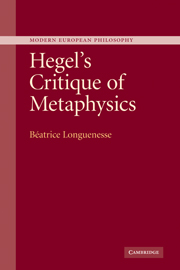Book contents
- Frontmatter
- Contents
- List of Abbreviations
- Note on Citations
- Preface
- PART I HEGEL'S CRITIQUE OF METAPHYSICS: A STUDY OF THE DOCTRINE OF ESSENCE
- Introduction
- 1 Transcendental logic and dialectical logic: from Kant to Hegel, a critique of all dogmatic metaphysics
- 2 Twists and turns of Hegel's contradiction
- 3 Ground against concept?
- 4 What is rational is actual, what is actual is rational
- Conclusion
- PART II POINT OF VIEW OF MAN OR KNOWLEDGE OF GOD
- Notes
- Bibliography
- Index
4 - What is rational is actual, what is actual is rational
from PART I - HEGEL'S CRITIQUE OF METAPHYSICS: A STUDY OF THE DOCTRINE OF ESSENCE
- Frontmatter
- Contents
- List of Abbreviations
- Note on Citations
- Preface
- PART I HEGEL'S CRITIQUE OF METAPHYSICS: A STUDY OF THE DOCTRINE OF ESSENCE
- Introduction
- 1 Transcendental logic and dialectical logic: from Kant to Hegel, a critique of all dogmatic metaphysics
- 2 Twists and turns of Hegel's contradiction
- 3 Ground against concept?
- 4 What is rational is actual, what is actual is rational
- Conclusion
- PART II POINT OF VIEW OF MAN OR KNOWLEDGE OF GOD
- Notes
- Bibliography
- Index
Summary
Hegel's notion of Wirklichkeit, actuality, is known above all through the sentence that appears in the Preface to the Principles of the Philosophy of Right:
What is rational is actual; and what is actual is rational. (S. 7, 24; R. 20)
A scandalous statement, and even more scandalous in the translation that long prevailed:
What is rational is real, and what is real is rational.
For in identifying Hegel's notion of Wirklichkeit with the more familiar notion of reality, this translation makes plausible an interpretation according to which, by elevating “the real” to the dignity of “the rational,” Hegel indulges in the speculative sanctification of what is, of the existing world. But in fact, Hegel's notion of Wirklichkeit has a quite specific content which resists any overly simplistic interpretation of the sentence just cited. This content is progressively laid out in Section 3 of the Doctrine of Essence (GW 11, 369–409; S. 6, 186–240; L. 529–571), where the exposition of Wirklichkeit (actuality) provides the transition to the concept (Book 2 of the Science of Logic). The concept, in turn, is what opens the way to the system expounded in the second and third parts of the Encyclopedia of Philosophical Sciences: the Philosophy of Nature and the Philosophy of Spirit.
In a way, then, the notion of “actuality” at work in the Principles of the Philosophy of Right is beyond that which is explained in the Doctrine of Essence of the Science of Logic.
- Type
- Chapter
- Information
- Hegel's Critique of Metaphysics , pp. 110 - 159Publisher: Cambridge University PressPrint publication year: 2007

